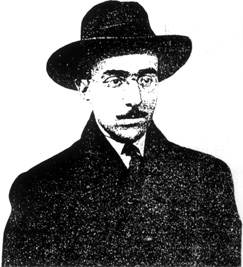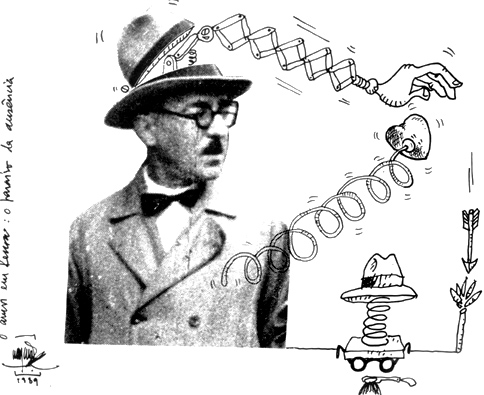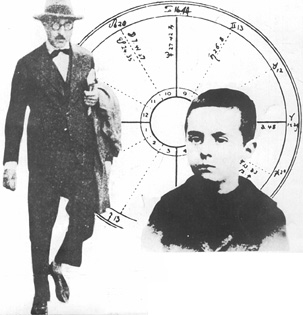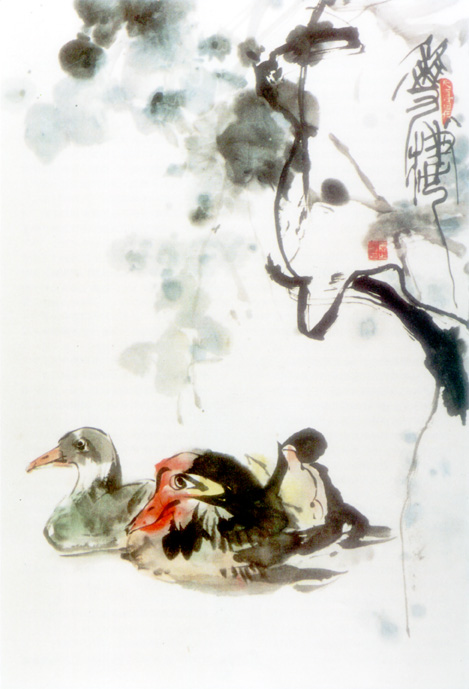
We continue to mark the centenary of Pessoa's birth with the publication of the text of a speech given by Manuela Vale in Macau's Complexo Escolar in June, 1988 during the Celebrations of Fernando Pessoa's Birth.
"Oh! bem aventurados fingimentos que, nesta ausensia, tão doces enganos sabeis fazer aos tristes pensamentos"
Camões
When I read and examine Pessoa's work, I try to distance the author as much as possible from his text. In other words, I regard the text as a universe in which the subject of the poetry does not come before the text but is rather created within and by the text itself.
The love one "experiences" on reading Pessoa in this way is not the love which Fernando Pessoa the citizen may have experienced. Consequently, there is no need for me to offer an analysis or explanation of his emotional life. What I shall do instead is enter into the relationship between the author and his work. I am going to enter a world of fiction, the fiction of language.
In order to enter this world it is nesessary to put aside our usual notions of cultural conformity, pragmatism and criticism of meaning. We embark on this circular search for Love with open, receptive minds. We have but one tool to work with on this adventure- that of the language of the poet, the man. Yet here again we are faced with the complexity of the poet concealed behind several masks: Fernando Pessoa, Alberto Caeiro, Ricardo Reis, Álvaro de Campos and Bernardo Soares.

Fernando Pessoa speaks of Western Love as a mythical construction created through the interweaving of Western philosophies and myths: Platonism, Orphism, Neoplatonism, Christianism, the rites of the Order of the Templar Knights, Adam and Eve, Eros and Psyche, courtly love... The poet thus creates his symbols and works through them in his personal search for direction.
When we speak of love we always speak of at least two people: I/You, Him/Her, I/Us, Us/Us, I/I. The Poet "reflects" on the presence or absence of the "being" whom he possessed, desired or rejected in a present or past time.
Even in her presence there is a hint of absence, words speak out of silence, her body is the image of "Another", a smile leads to "some paradise" which is no longer experienced, this is a Time consisting of "surprise" and "ruination", looks are meaningless, dreams are not voyages. The "I" knows of the impossibility of Love here and now, that Love is a shadow, a dream which speaks of other dreams, a possible path to an "impossible garden". The encounter between the "unknown" and "nobody" (see "Eros e Psique").
And then the desire, or rather desires:
1 - to sleep
"... se vieres, não te sentes a meu lado, nem fales,/ só quero dormir, uma morte que seja uma/ coisa que me não rale nem com que tu te rales/ Que ninguém deseja nem não deseja" "Quero dormir sossegado, sem nada que desejar/ Quero dormir na distância de um ser que nunca foi seu..."
2 - to dream
"... um país/ onde ser feliz consiste/ Apenas em ser feliz... o sentir e o desejar/ são banidos dessa terra/ O amor não é amor/ Nesse país por onde erra/ Meu longínquo divagar"
3 - for tenderness
"Poẽ-me as mãos nos ombros.../ Beija-me na fronte.../ Minha vida é escombros,/ A minha alma insonte/ Eu não sei porquê,/ Meu desde onde venho/ Sou o ser que vê,/ E vê tudo estranho./ Poẽ a tua mão sobre o meu cabelo.../ Tudo é ilusão./ Sonhar é sabê-lo"
4 - to postpone
"Deixa-me ouvir o que não ouço.../ Não é a brisa ou o arvoredo;/ É outra coisa intercalada.../ É coisa que não posso/ouvir senão em segredo,/ e que talvez não seja nada.../ Deixa-me ouvir... não fales alto!/ Um momento!... Depois o amor..."
5 - for solitude
"Minha mulher a solidão,/ Consegue que eu não seja triste./ Ah, que bom é ao coração/ Ter este bem que não existe!/... Senhor, se há bem que o céu conceda/ Submisso à oppressão do Fado,/ Dá-me eu ser só - Veste de seda -/ E fala só -Leque animado"
6 - to be one
"Que pena sermos dois! Meu amor, somos dois./ Vejo-te, somos dois..."
7 - to give up
"Já não me importo/ até com o que amo ou creio amar/ Sou um navio que chega a um porto/ E cujo movimento é ali estar"
8 - to abdicate
"Repousei porque abdiquei".
But if, as António Quadros claims, the dominant note in Fernando Pessoa per se is the "Platonic essentialism, the vision of the pure idea and the contrast with the impossibility of achieving it", then we cannot ignore two poems from Poesias and Poesias Inéditas respectively: "Dá a surpresa de ser..." and "O amor quando se revela...". In the former, physical desire for the woman is no less real even though it is not realized. In the latter, one sees the birth of passion... a certain adolesence in love.
Dá a surpresa de ser.
É alta, de um louro escuro.
Faz bem só pensar em ver
Seu corpo meio maduro.
Seus seios altos parecem
(Se ela estivesse deitada)
Dois montinhos que amanhecem
Sem ter que haver madrugada.
E a mão do seu braço branco
Assenta em palmo espalhado
Sobre a saliência do flanco
Do seu relevo tapado
Apetece como um barco.
Tem qualquer coisa de gomo.
Meu Deus, quando é que eu embarco?
Ó fome, quando é que eu como?
What is surprising is that in the end Fernando Pessoa is also the poet of Love and Women in Quadras ao Gosto Popular. According to Jacinto do Prado Coelho, in this text he "appears primarily as a love poet. Given his fertile imagination, he can express love in a variety of situations and multiple psychological settings... shy, entangled, humble, pure, idealistic, hopeful, hopeless love... gallantry... peaceful of slightly disturbing intimacy, sensual, malicious, daring love... jealousy, the suffering of absence...".
Deixa que o momento pense
Que ainda vives ao meu lado...
Triste de quem por si mesmo
Precisa ser enganado!
Teus brincos dançam se voltas
A cabeça a perguntar.
São como andorinhas soltas
Que inda não sabem voar.
Dei-lhe um beijo ao pé da boca
Por a boca se esquivar.
A ideia talvez foi louca.
O mal foi não acertar.
 Illustration by Carlos Marreiros © copyright 1989
Illustration by Carlos Marreiros © copyright 1989
Alberto Caeiro, the Poet of Nature, experiences Love as a part of Nature. To be loved is the result of a choice made by the woman who loves him. This preference, however, will alter his perspective of nature: "Tu mudaste a Natureza.../ Trouxeste-me a Natureza para o pé de mim, /Por tu existires vejo-a melhor, mas a mesma,/ por tu me amares, amo-a do mesmo modo, mas mais". When the poet loves and is loved, his love for nature is heightened and he concludes that "Os campos, afinal, não são tão verdes para os que são amados/ como para os que não são/ Sentir é estar distraído ".
There is, nevertheless, a new way of being, feeling, living in Nature which involves being more abstracted from nature, perhaps, but more attentive to the self. And there follows a new definition of the new feeling: "O amor é uma companhia" even when she is absent. Moreover, it should be taken into account that the object of love is always physically absent. The man is mostly remembered in the future, the woman is the image which provokes new images: "Amanhã virás, andarás comigo a colher flores pelo campo,/ E eu andarei contigo pelos campos a ver-te colher flores./ Eu já te vejo amanhã a colher flores comigo pelos campos,".
There are moments in which Nature is impregnated with this image. Everything is transformed through imagination: "Mesmo a ausência dela é uma coisa que está comigo... Toda a realidade olha para mim como um girassol com a cara dela no meio". What is reality? For the poet, the lover, dreams are more real: "E posso estar na realidade onde está o que sonho". All the same, this intense feeling is not the product of desire in the usual sense of the word. She is an absent companion - "o melhor é não sentir mas pensar/ Quando desejo encontrá-la/ Quase prefiro não a encontrar,/ Para não ter que a deixar depois./ Não sei bem o que quero, nem quero saber o que quero. Quero só/ pensar nela. Não peço nada a ninguém, nem a ela, senão pensar".
Is this a new way of loving? This distancing from pain which the "loving shepherd" has felt? The sensation that it is all a trick, or the desire for freedom? When he found out that "ninguém o tinha amado afinal./ Quando se ergueu da encosta e da verdade falsa viu tudo. (and once more the air) que lhe faltara tanto tempo, lhe entrou fresco nos pulmões/ E sentiu que de novo o ar lhe abria, mas com dor uma liberdade no peito ".
Nevertheless, this feeling is perfectly natural and as such I would accept it. Just as the possibility of a meeting is impossible for Pessoa, when it occurs a "we" is only illusion. It is Nature that perdures - it is real, it has nothing within and exposes everything to view: "Uma vez amei, julguei que me amariam,/ mas não fui amado/ não fui amado pela única grande razão -/ Porque não tinha que ser./ Consolei-me voltando ao sol e à chuva ".
To sum up, the "master" suffers from the contradictions of Love and it is Fernando Pessoa who notes that Caeiro is not always the "objective poet" he purported to be. Due to love, "the poet's brain becomes confused, his philosophy entangled"("Páginas Íntimas e de Auto-Interpretação").
The philosophy of acceptance is one of the dominant features of Ricardo Reis' poetry. Fado rules Love, just as it rules life. In order for Love to flourish it must adpot a mask of unconsciousness, distraction, building up a way of "being" combined with stoicism, epicureanism, enjoying the freedom allowed by Fate, wisely avoiding suffering in the knowledge that it would complicate things, a necessary condition for happiness.
Vem sentar-te comigo, Lídia, à beira do rio.
Sossegadamente fitemos o seu curso e aprendamos
Que a vida passa, e não estamos de mãos enlaçadas
(Enlacemos as mãos).
Depois pensemos, crianças adultas, que a vida
Passa e não fica, nada deixa e nunca regressa,
Vai para um mar muito longe, para ao pé do Fado,
Mais longe que os deuses.
Desenlacemos as mãos, porque não vale a pena cansarmo-nos
Quer gozemos, quer não gozemos, passamos como o rio.
Mais vale saber passar silenciosamente
E sem desassossegos grandes.
Sem amores, nem ódios, nem paixões que levantam a voz,
Nem invejas que dão movimento demais aos olhos,
Nem cuidados, porque se os tivesse o rio sempre correria,
E sempre iria ter ao mar.
Amemo-nos tranquilamente, pensando que podíamos,
Se quiséssemos, trocar beijos e abraços e carícias,
Mas que maris vale estarmos sentados ao pé um do outro
Ouvindo correr o rio e vendo-o.
Colhamos flores, pega tu nelas e deixa-as
No colo, e que o seu perfume suavize o momento-
Este momento em que sossegadamente não cremos em nada,
Pagãos inocentes da decadência.
Ao menos, se for sombra antes, lembrar-te-ãs de mim depois
Sem que a minha lembrança te arda ou te fira ou te mova,
Porque nunca enlaçámos as mãos, nem nos beijámos
Nem fomos mais do que crianças.
E se antes do que eu levares o óbolo ao barqueiro sombrio,
Eu nada terei que sofrer ao lembrar-me de ti.
Ser-me-ás suave à memória lembrando-te assim - à beira-rio,
Pagã triste e com flores no regaço.

Thus, Love is rejected just when everything points to its potential. "She" is a travelling companion on the journey of life and her only end is the end of Love - Death.
The three or four women (Lídia, Neera, Cloe and Marcenda) and the paramour mentioned in his poems are no more than shadows and the love they experience is also no more than a shadow: "Deixemme apenas/ A consiência lúcida e solene/ Das coisas e dos seres/ Pouco me importa/ Amor ou glória... O Amor é uma sombra ".
Like Caeiro, Ricardo Reis feels that love curtails freedom and because of this he rejects it: "Não quero, Cloe, teu Amor que oprime/ porque me exige o amor./ Quero ser livre... ".
And still we have the problem of the "I" and its relationship with a "you" with the conclusion that although love can be deep it is always "distante, corruptível, ilusório ou intelectual" (António Quadros) and that "to love" is a verb devoid of any meaning.
"Ninguém a outro ama, senão que ama/ O que de si há nele, ou é suposto./ Nada te pese que não te amem. Sentem-te/ Quem és, e és estrangeiro./ Cura de ser quem és, amam-te ou nunca./ Firme contigo, sofrerás avaro/ De penas".
To love or not, to be loved or not is the same thing. This is not the path leading to the "hora do barqueiro". Paradise is not here, nor can it be experienced even though the landscapes are paradisical and we inhabit them as pagan gods and goddesses with garlands in our hair and flowers on our laps.
By now, it should be possible to feel the plurality not only within the poet but also the plurality of plurality itself. Behind each mask the poet feels and thinks in a completely different way. The best example of this is shown in Álvaro de Campos (the poet of feelings): "Sentir tudo de todas as maneiras/ Ter todas as opiniões/ Ser sincero contradizendo-se a cada minuto - Desagradar a si próprio pela liberdade de espírito/ E amar as coisas como Deus".
The freedom which he claims for himself (and for the other) permits him to express the various ways of experiencing love. His poems reflect a desire which alternately overflows or contains itself, which can fit in with any experience. An excess of feeling and his own imagination lead him to love in another, new way, a way which is unexpected and yet more lively, with a virile reaction to the world, western culture, norms, and the morality that demands that he "eat" love as everyone else does:
Um dia, num restaurante, fora do espaço e do tempo,
Serviram-me o amor como dobrada fria.
Disse delicadamente ao missionário da cozinha
Que a preferia quente,
Que a dobrada (e era à modo do Porto) nunca se come fria.
Impacientaram-se comigo.
Nunca se pode ter razão, nem num restaurante.
Não comi, não pedi outra coisa, paguei a conta,
E vim passear para toda a rua.
Quem sabe que isto quer dizer?
Eu não sei, e foi comigo...
(Sei que na infância de toda a gente houve um jardim.
Particular ou público, ou do vizinho.
Sei muito bem que brincarmos era o dono dele.
E que a tristeza é de hoje).
Sei isso muitas vezes,
Mas, se eu pedi amor, porque é que me trouxeram
Dobrada à moda de Porto fria?
Não é prato que se possa comer frio,
Mas trouxeram-mo frio.
Não me queixei, mas estava frio,
Nunca se pode comer frio, mas veio frio.
As he knows he is different, he sometimes feels a need for solitude and even anihilation: "Falta-me um sentido, um facto/ Para a vida, para o amor, para a glória.../ Estou só como ninguém ainda esteve, oco dentro de mim,"; other times he wants to be the same as other people: "Gostava de gostar de gostar"; at others, he feels a marked desolation: "quanto fui, quanto não fui, tudo isso sou./ Quanto quis, quanto não quis, tudo isto me forma/ Quanto amei ou deixei de amar é a mesma saudade em mim"; and a metaphysical exhaustion which results from being aware of this plurality of the self which still knows how to love like the "reais e felizes".
Because he is aware of the various "I's", the poet rejects a single identity. In other words, he claims his absence. This absence is the negation of "being" and by claiming this negation he is really saying "not being": "Sou em mim, a charada sincopada/ Que ninguém da roda decifra". There is then an appeal: "Cruza as mãos sobre o joelho, ó companheira que eu não tenho nem quero ter.../ Olha-me em silêncio e em segredo e pergunta a ti própria - Tu que me conheces - quem eu sou". Is there anyone capable of deciphering him? But he is also a shadow, even though his body is real and as all his women are also shadows, it is impossible for them to be united because everything and everyone is externalised and the poet is searching for something other than a visible reality. Instead he is trying to attain the inner depths of everything, the essence of the "self" which is reflected in a kaleidoscopic game of mirrors.
Eduardo Lourenço claims that: "Campos is... the constant expression of a gut anxiety which is determined by the mysterious and unacceptable absence of the Poet's Unity. All his poetry is a painful labyrinth of this ambiguity looking for the way out but achieving nothing other than becoming increasingly enmeshed". The lack of unity within the "I" and of a union with another "I" are best reflected in "Passagem das Horas" and "Oda Marítima":
... Multipliquei-me, para me sentir,
Para me sentir, precisei sentir tudo,
Transbordei, não fiz senão extravasar-me,
Despi-me, entreguei-me,
E há em cada canto da minha alma um altar a um deus diferente.
Os braços de todos os atletas apertaram-me subitamente femenino.
E eu só de pensar nisso desmaiei entre músculos supostos.
Foram dados na minha boca os beijos de todos os encontros,
Acenaram no meu coração os lenços de todas as despedidas,
Todos os chamamentos obscenos de gestos e olhares
batem-me em cheio em todo o corpo com sede nos centros sexuais.
Fui todos os ascetas, todos os postos-de-parte, todos os como que esquecidos,
E todos os pederastas - absolutamente todos (não faltou nenhum).
Rendez-vous a vermelho e negro no fundoinferno da minha alma!
(Freddie, eu chamava-te Baby, porque tu eras louro, branco e eu amava-te,
Quantas imperatrizes por reinar e princesas destronadas tu foste para mim!)
Mary, com quem eu lia Burns em dias tristes como sentir-se viver,
Mary, mal tu sabes quantos casais honestos, quantas famílias felizes,
Viveram em ti os meus olhos e o meu braço cingindo e a minha consciência incerta,
A sua vida pacata, as suas casas suburbanas com jardins, os seus half-holidays inesperados...
Mary, sou infeliz...
Freddie, sou infeliz...
Oh, vós todos, todos vós, casuais, demorados.
(...)
Quantas vezes tereis pensado em pensar em mim sem que o fizésseis,
Ah, quão pouco eu fui no que sois, quão pouco, quão pouco -
Sim, e o que tenho eu sido, ó meu subjectivo universo.
Ó meu sol, meu luar, minhas estrelas, meu momento,
Ó parte externa de mim perdida em labirintos de Deus!
Passa tudo, todas as coisas num desfile por mim dentro,
E todas as cidades do mundo, rumorejam-se dentro de mim....
One of the factors within this multiple universe which is the "other" created from the ability to be "elástico, mole, agulha, trepidação" is quite definitely feminine. The other factor is masculine. In order to find out the essence of love, we are presented with the myth of Hermaphrodite. By expressing presence, the affirmation of absence - "Eu sinto que ficou fora do que imaginei tudo o que quis,/ Que embora eu quisesse tudo, tudo me faltou" - we are actually presented with a Paradise where, because everything is felt, nothing "is" - in other words, the Night.
In "Oda Marítima", Âlvaro de Campos, in his escape from reality and with an excessive desire to go on a journey of inner discovery, attempts to search for another time, another space, another way of finding the real "I" and "us". Yet again, he invests himself (and invests love) with a feminine passiveness in order to find the "other" side, the other half of himself. I do not believe that it is the desire to experience love from another perspective that leads him to dream that he is "feminine", but rather the desire to explore all the facets of "being", the desire to find unity on the road to plurality. The feeling that he has and that we have is of failure. This is not the way. So where, then, is happiness? Is the exhaustion brought on by too much emotion, the memory of childhood, the journey to the past, the attempt to breach distances? Is this the real world? Is it paradise lost? And yet, later, we are again shown an accessible reality: "E abro de repente os olhos, que não tinha fechado/ Ah, que alegria a de sair dos sonhos de vez! Eis outra vez o mundo real, tão bondoso para os nervos!"
Toma-me pouco a pouco o delírio das coisas marítimas,
Penetram-me físicamente o cais e a sua atmosfera,
O marulho do Tejo galga-me por cima dos sentidos,
E começo a sonhar, começo a envolver-me do sonho das águas
Começam a pegar bem as correias-de-transmissão na minh' alma.
E a aceleração do volante sacode-me nitidamente.
(...)
Chamam por mim as águas.
Chamam por mim os mares.
Chamam por mim, levantando uma voz corpórea, os longes.
As épocas marítimas todas sentidas no passado, a chamar.
(...)
Ah, piratas, piratas, piratas!
Piratas, amai-me e odiai-me!
Misturai-me convosco, piratas!
Ah, ser tudo nos crimes! ser todos os elementos componentes
Dos assaltos aos barcos a das chacinas e das violações!
Ser quanto foi no lugar dos saques!
Ser quanto viveu ou jazeu no local das tragédias de sangue!
Ser o pirata-resumo de toda a pirataria no seu auge,
E a vítima-síntese, mas de carne e osso, de todos os piratas do mundo!
Ser o meu corpo passivo a mulher-todas-as--mulheres
Que foram violadas, mortas, feridas, rasgadas pelos piratas!
Ser no meu ser subjugado a fêmea que tem de ser deles
E sentir tudo isso-todas estas coisas duma só vez -pela espinha!
(...)
Ah, o orvalho sobre a minha excitação!
O frescor nocturno no meu oceano interior!
Eis tudo em mim de repente ante uma noite no mar
Cheia de enorme mistério humaníssimo das ondas noturnas.
A lua sobe no horizonte
E a minha infância feliz acorda, como uma lágrima, em mim.
O meu passado ressurge, como se esse grito marítimo
Fosse um aroma, uma voz, o eco duma canção.
Que fosse chamar ao meu passado
Por aquela felicidade que nunca mais tornarei a ter.
Era na velha casa sossegada ao pé do rio...
(As janelas do meu quarto, e as da casa-de-jantar também,
Davam, por sobre umas casas baixas, para o rio próximo,
Para o Tejo, este mesmo Tejo, mas noutro ponto, mais abaixo...
Se eu agora chegasse às mesmas janelas não chegava às mesmas janelas.
Aquele tempo passou como o fumo dum vapor no mar alto...)
Where is love's place at this crossing point of "present and absent landscapes, the present and the past, dream and reality"? (Jacinto de Coelho Prado). I believe that love is never anything more than a mirage. All hopes and all experiences lead to the same absence. The "I" never travels in a way that allows a definite meeting with the "other". This is either because the "I" is not real and has just been imagined, or because, the "other" is not there, even though he or she may perhaps have been there before. There is no oasis in this desert of life.
Finally, or always, the exhaustion.... the restlessness....
The prose work O Livro de Desassossego by Bernardo Soares, was "introduced" to Casais Monteiro by Fernando Pessoa in a letter dated the 13th of January, 1935: "My semi-heteronym, Bernardo Soares, who is very similar to Álvaro de Campos in many respects, always seems to be tired or sleepy which means that I have slightly suspended the characteristics of reasoning and inhibition; the prose is a continual daydream. He is a semi-heteronym because although the personality is not mine it is no different from mine but rather a simple mutilation. It is me but with no powers of reasoning nor affection." The book is a collection of fragments which the author describes as "disjointed impressions", "wanderings", in which love is also reflected.
While it may not be possible to claim outright that this book brings together the experiences of Pessoa's various personae, at least it could be said that "within the world created by Pessoa, there is a lot in common with the real world - namely the visions of love between this "inexistent author" and the masks of the real author" (Jacinto do Prado Coelho).
I shall now examine the poetic prose piece entitled "Na floresta do alheamento". Here we have a narrative written in the first person in which the "I", on awakening, feels that he is a stranger in his own room: "Eu não estou onde nem o que sonho". The situation in which he is placed is, nevertheless, realthere is an "alcova mórbida e morna" and the "antemanhã de lá fora é apenas um hálito de penumbra ". There is also clearly another reality which at times coexists with the former: "Coexistem na minha atenção algemada as duas realidades, como dois fumos que se misturam ".
First we have the "alcove", then the "forest" and finally a "woman". Later, the poet asks "E quem é esta mulher que comigo veste de observada essa floresta alheia?". And here we have the paradox: "Há muito que com essa mulher que desconheço erro... Sinto em mim séculos de conhecer aquelas árvores". As the author makes his way through the text, the image of the alcoves remains although now it is part of a new reality: "lá fora a antemanhã tão longínqua ". All the space and time is now taken up by dream: "A floresta tão aqui ante outros olhos meus!".
And the "us" takes shape during this walk through the forest although the love is not purely sensual: "passeávamos às vezes, braço dado, sob os cedros e as olaias e nenhum de nós pensava a viver. A nossa carne era-nos um perfume vago e a nossa vida um eco de som de fonte. Dávamo-nos as mãos e os nossos olhares perguntavam-se o que seria o ser sensual e o querer realizar em carne a ilusão do amor...".
Even though the forest may be a garden (of Eden? of dreams?) there is no chance of being truly happy. A feeling of uselessness pervades the atmosphere: "Na Clepsidra da nossa imperfeição gotas regulares de sonho marcavam horas irreais. Nada vale a pena, ó meu amor longínquo, senão o saber como é suave saber que nada vale a pena..."
In the meantime, a higher sentiment is born: "contentes de não ser nada, de não ter desejos nem esperanças, de nos termos esquecido da cor dos amores e dos saberes e dos ódios. Julgávamo-nos immortaes..." Is this a renewed encounter with Paradise? Yet reality makes him aware once more of his mortality and although the woman accompanies him back to the alcove, he reaches the conclusion that: "Nenhum de nós tem nome ou existência plausível", at which they flee once more to the forest only to find that: "Surge ante nós outra vez, a floresta muita, mas agora mais perturbada da nossa perturbação e mais triste da nossa tristeza..." and, further on, "éramos obscuramente dois, nenhum de nós sabendo bem se outro não elle próprio, se incerto outro viveria...". Looming up is the temptation of knowledge, of sin... of the forbidden fruit: "éramos só um,... cada um de nós era uma ilusão do outro, e cada um, dentro de si, o mero echo do seu próprio ser..." It is impossible to live in this forest because it is a "Forest of Alienation" as the title indicates and we are thus an abstraction, strangers, separated, out of place, distracted, ignorant.
"Zumbe um a mosca, incerta e mínima...." - reality has returned to alienate us in another, more deceitful way: "a manhã rompeu, como uma queda, do cimo pálido da Hora". The dream has ended: "Acabaram de arder, meu amor, na lareira da nossa vida, as achas dos nossos sonhos..."Finally, we have the acceptance of the punishment - with no tears, no hate, no desires - the Paradise of Absence.
The theme of the forest is taken up by Bernardo Soares along with the other topics he deals with: the unity and plurality of the self; the identification of an "I" and a "you"; the impossibility of a "we" in the present; the intuition that "she" is a part of "Him" (the biblical myth of the origin of woman); the "distaste of real women"; the dream (the presence of absence); a desire which is never erotic; a rejection of possession; the sincere pretence at love; the pleasure of looking ("O Amante Visual"); solitude, the recognition that love is impossible to attain: "O amor é um misticismo que quer praticar-se, uma impossibilidade que só é sonhado como devendo ser realizada".
In concluding this article, I must admit that it is really not possible to reach any firm conclusions about "Love in Pessoa". It was Camões who said: "Love is so contrary to itself" and as we know, Fernando Pessoa is the poet of diversity ("Deus não tem unidade, como a terei eu?"). I believe it is only possible to make the following two points:
- Pessoa's literary texts speak to us of "existence" through "absence": "abrindo-nos de chofre as cem portas do "instante", nossa pátria limitada e natural"(Eduardo Lourenço).
- Produtos românticos, nós todos...
E se não fossemos produtos românticos, se calhar
não seriamos nada.
Assim se faz a literatura.
Santos Deuses, assim até se faz a vida
(Álvaro de Campos)


Illustration by Un Chi lam © copyright 1988
Translated from the Portuguese
by Marie Imelda Macleod
*Graduate in French and Spanish (Oporto University), now employed as a teacher of Portuguese Language and Literature; researcher on Macau's Literature, author of several newspaper and magazine articles.
start p. 65
end p.